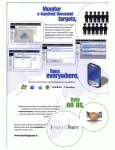 By JENNIFER VALENTINO-DEVRIES, JULIA ANGWIN and STEVE STECKLOW
By JENNIFER VALENTINO-DEVRIES, JULIA ANGWIN and STEVE STECKLOW
Documents obtained by The Wall Street Journal open a rare window into a new global market for the off-the-shelf surveillance technology that has arisen in the decade since the terrorist attacks of Sept. 11, 2001.
The techniques described in the trove of 200-plus marketing documents, spanning 36 companies, include hacking tools that enable governments to break into people’s computers and cellphones, and „massive intercept“ gear that can gather all Internet communications in a country. The papers were obtained from attendees of a secretive surveillance conference held near Washington, D.C., last month.
Stewart Baker, the former assistant secretary for Homeland Security, talks with WSJ’s Julia Angwin about the need for balancing privacy rights with security concerns and explains why privacy may one day be a luxury available to the privileged and the rich.
Intelligence agencies in the U.S. and abroad have long conducted their own surveillance. But in recent years, a retail market for surveillance tools has sprung up from „nearly zero“ in 2001 to about $5 billion a year, said Jerry Lucas, president of TeleStrategies Inc., the show’s operator. (more on wsj.com)
